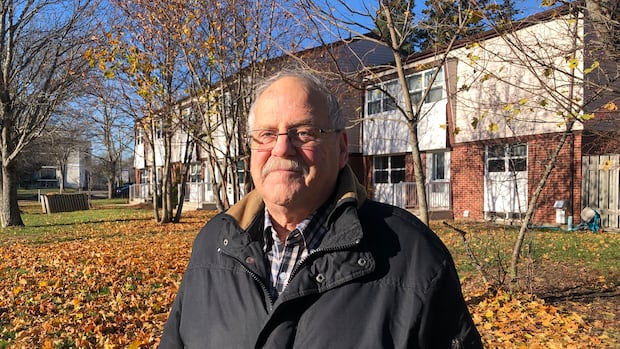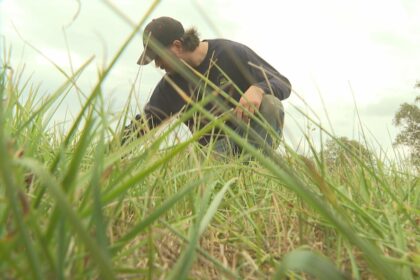New BrunswickThere’s a resurgence in housing co-operatives in New Brunswick, with plans afoot for three new co-ops promising about 200 units of affordable and secure housing in Sackville, Fredericton and northern New Brunswick. National funding program already over-subscribed with shovel-ready projectsErica Butler · CBC News · Posted: Nov 23, 2025 11:00 PM EST | Last Updated: 2 hours agoListen to this articleEstimated 6 minutesThe audio version of this article is generated by text-to-speech, a technology based on artificial intelligence.John Bourque is vice-president of Moncton’s Maple Grove Co-operative, where a three-bedroom townhouse costs ‘well below $1,000’ a month. (Erica Butler/CBC)A “small but mighty” part of New Brunswick’s housing makeup is poised to grow in the coming years, as three new housing co-operatives finalize plans to build about 200 new units in the province.Tim Ross, director of the Co-operative Housing Federation of Canada, said three new projects — in Fredericton, Sackville and an as-yet-unreleased location in the north — represent a resurgence in co-op development, which previously had flourished before the federal government’s withdrawal from housing programs in the early 1990s. “Governments are now in catch-up mode,” said Ross, citing new funding programs aimed at growing affordable housing, including co-ops. Housing co-ops are affordable by design, Ross said. A study commissioned by the federation found that in 2021, co-op apartments were between $400 and $500 less per month than private rentals. There are three key reasons for the gap, Ross said. Co-ops “operate on an economic break-even basis” as non-profits, most have access to grants or low-cost public borrowing, and they are not subject to the whims of the housing market, he said.Figure from The Co-op Difference, a July 2022 report by Greg Suttor, Chidom Otogwu and Nick Falvo comparing co-op and market rents in five Canadian cities. (Co-operative Housing Federation of Canada)“Co-ops are not being bought and sold on a regular basis,” he said, so they are removed from the speculative market that has helped drive up private housing prices. “And that’s so important right now, because we’re losing affordable housing in Canada at an alarming rate.”According to the Canada Mortgage and Housing Corporation’s Rental Market Survey, average rents in New Brunswick increased from $812 in 2019 to $1,229 in 2024, a jump of about 51 per cent over the five-year period. Fredericton, Sackville co-ops in worksThe baked-in affordability of a housing co-op is something Janet Flowers is hoping to bring to new households in Fredericton. Flowers was the city’s first affordable housing development co-ordinator and is now president of the New Brunswick Collaborative Housing Co-operative.The group’s first project is a 97-unit building on Brown Boulevard on Fredericton’s north side. It will include a mix of one, two and three-bedroom units with common indoor and outdoor space. The site is already zoned appropriately, said Flowers, and if funding falls into place, could start construction as early as next June. The City of Fredericton donated two lots (25-16 and 25-17) at the end of Cliffe Street, on Fredericton’s north side, to the New Brunswick Collaborative Housing Co-operative. (City of Fredericton)The plan is for some of the units to be subsidized by the provincial and federal governments so tenants would pay no more than 30 per cent of their income. The other units are expected to be at market rent or less. A new housing co-op is also being planned on the outskirts of Sackville. The Freshwinds Eco-Village Housing Co-operative plans to build 68 units in small buildings and townhouses in a village-style cluster off Fairfield Road. Up to 20 of the units will be subsidized, while the others will start off closer to market rates for the region. Freshwinds co-chair Sabine Dietz said that within two years “you’ll see the difference in affordability” for those units as market rents continue to rise and Freshwinds housing charges remain flat. ‘A co-op is a community’John Bourque of Moncton has lived at the Maple Grove Co-operative for 44 years. He is vice-president of the co-op, and said participation by its members is what keeps the housing costs low.WATCH | Why co-ops are able to keep costs low:At Maple Grove, Bourque said, a three-bedroom townhouse costs “well below $1,000″ a month, and the waiting list is between five and 10 years.Members of a non-profit housing co-op don’t own their units individually and cannot sell them. If a non-profit co-op dissolves, its assets must go to another co-op with similar goals. Members have security of tenure and are responsible for making decisions about how the co-op runs.”A co-op is a community,” Bourque said.Public funding key to new co-op projectsDietz said Freshwinds could start construction within six months of funding approval from the federal Co-op Housing Development Program, a $1.5 billion fund offering grants and loans to new co-op housing projects. Sabine Dietz is co-chair of the Freshwinds Eco-Village Housing Co-operative, which is waiting to hear back about an application for $22 million in loans and grants from the federal government. (Erica Butler/CBC)The Sackville co-op has already bought the land for its project and received a conditional $1.6 million funding commitment from New Brunswick Housing Corp. The province has also committed to subsidize rents for some units. But the project needs federal funding to proceed. Freshwinds first applied unsuccessfully in 2024 and is now awaiting word on its second-round application requesting $22 million in grants and loans. Flowers said investment from all levels of government is critical to the Fredericton project moving ahead. The city donated the land for the project, and the province has already provided pre-development funding. The co-op is planning to apply for federal dollars as soon as drawings are complete. ‘Overwhelming’ demand for federal fundingSo far, the federal fund has approved $423 million for eight projects in Canada, and another round of funding announcements is expected this month.Ross said the demand so far has been “overwhelming.” The housing federation helped design the federal funding program, which he said is already over-subscribed with qualified projects. Tim Ross, executive director of the Co-operative Housing Federation of Canada, said new federal funding is over-subscribed with shovel-ready projects. (Erica Butler/CBC)“It’s not just a group sitting around a table thinking that they’d like to create a co-op,” Ross said. “It’s groups that have spent millions of dollars on feasibility and pre-development work to get shovel-ready.”Ross is also anxious to find out more about Build Canada Homes, the newly minted federal agency that promises low-cost financing for “non-market and Indigenous housing providers”. “We are actively seeking and pursuing solutions to get all viable projects built,” Ross said, “because we can’t afford to lose these opportunities when we’re in a housing crisis.” ABOUT THE AUTHORErica Butler is a reporter with CBC New Brunswick. She lives in Sackville and works out of the Moncton newsroom. You can send story tips to erica.butler@cbc.ca.
With federal support, N.B. could see greater growth in housing co-ops











